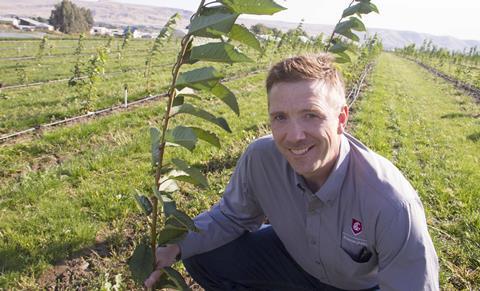Collaboration will accelerate the breeding and release of improved varieties for the US and global markets
Sun World International has joined forces with Washington State University (WSU) to develop a new generation of high flavour sweet cherries that ripen earlier and are more practical to grow.

Horticulture associate professor and stonefruit breeder Per McCord and Sun World scientists have agreed to share germplasm from promising cherry varieties under a new research collaboration launched this spring.
The agreement allows researchers to exchange and study genetic material from their respective collections aimed at speeding up breeding and release of improved varieties for orchards in the Pacific Northwest, California, the greater Northwest, and worldwide.
“Pursuing partnerships such as the WSU and Sun World collaboration is a key priority and helps ensure that we remain leaders in the industry,” said Sun World’ chief science officer Jennifer Petersen.
“We continue to focus on partnerships that enable us to develop varieties that meet the demands of growers and consumers in a dynamic marketplace.”
McCord commented: “Sun World has desirable germplasm, and we have material that they can benefit from. Now, we’re able to share our parental varieties for new crosses, and potentially, high quality releases.”
Sun World’s sweet cherry breeder and molecular specialist, Dr Terrence Frett, said the combined research efforts will result in the development of novel cherry varieties that are appealing to consumers and desirable to growers.
“Through our global network, we will enable growers around the world to produce these WSU-Sun World varieties,” he commented.
Germplasm is genetic material found inside pollen and seeds. Plants exchange germplasm to reproduce, and fruit breeders seek out promising parent plants with desired traits, crossing them with other varieties to develop new and better varieties.
Cherry breeding at WSU dates to the 1950s, when USDA scientist Howard Fogle developed the Rainier cherry, released in 1960 and now the most popular sweet variety in Washington State.
McCord said he is seeking cherries with large fruit size, excellent firmness and flavour, superb postharvest qualities, and cracking and disease resistance adapted to the cooler climates of the Pacific Northwest.
Sun World’s germplasm has been developed over a 17-year period with the same objectives, and an added focus on developing low- and mid-chill cherry varieties adaptable to the hot California climate and similar regions around the world, offering cherry varieties with better consistency in quality that are less susceptible to sunburn, heat damage and sutures, a defect that causes a deep cleft in the fruit.
Being able to harvest a variety early in the season is an especially desired trait as it expands the window of availability and offers higher value to growers.
Development of new varieties takes a decade or more, as breeders like WSU and Sun World compare and winnow out hundreds of different crosses in a series of orchard trials.
Potentially saving time in this long process, the partnership also offers opportunities for dialogue and collaboration in breeding and research.
Both programmes continue to expand their knowledge and use of DNA molecular markers associated with important breeding traits, Frett said, noting the benefits of improving efficiency, reducing costs, and further adapting cherry varieties to the complex challenges of climate change.
“I’m excited to bring in Sun World’s ultra-early and early cherry material,” McCord said. “This new material will help extend our programme further into the early Pacific Northwest season, further adapt to a changing environment, and provide new, grower-friendly cherry varieties to our growers.”



